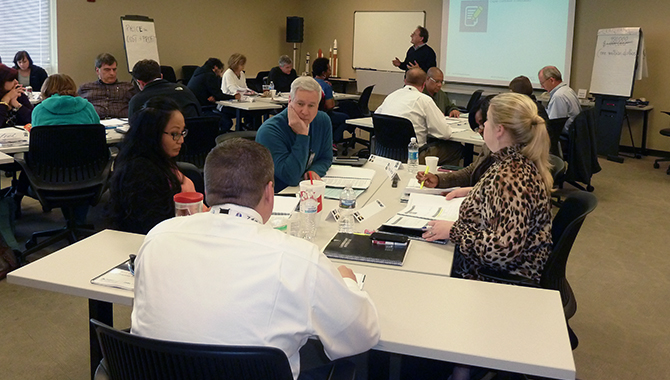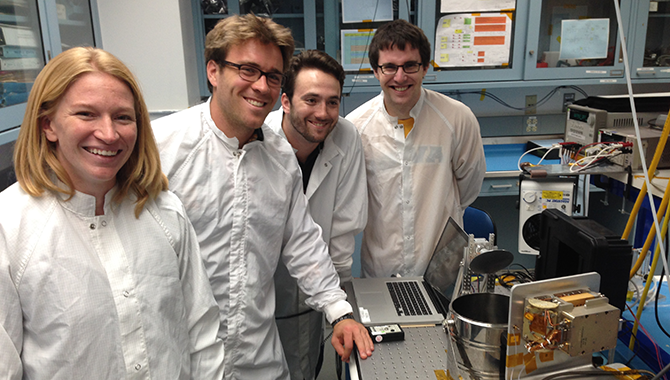
In January 2017, instructor Marek Kaszubski led a pilot offering of a new APPEL course: Contract Management Principles and Practices for Project Managers. The course has since been formally added to the APPEL curriculum.
Photo Credit: NASA APPEL/Daniel Daly
Have you ever wondered how APPEL conceives, designs, and develops its courses? For the first time, experts from APPEL’s Curriculum and Training & Support teams discuss the process.
APPEL supports NASA as a primary internal resource for project management and systems engineering development and training. The Academy’s goal is to help ensure the agency’s technical workforce has the skills and knowledge required to advance mission success. To achieve this goal, APPEL creates courses that meet training demands identified by stakeholders across the agency as being critical to established or emerging mission needs.
“APPEL has strong relationships with NASA subject matter experts [SMEs]. As a result, we often get the idea for a course when an SME approaches us and points out a need for training on a particular subject,” said APPEL Curriculum Manager Donna Wilson. “Sometimes, an individual from a NASA center contacts us about creating a course. This happened recently with our new offering, Introduction to Project Management at NASA. For the series we developed on acquisition, we reached out to a procurement SME to ensure the courses were in line with agency regulations.” The acquisition series includes Contract Management Principles and Practices for Project Managers, Federal Acquisition Regulation (FAR) Overview, Project Acquisition Workshop, and Types of Contracts.
“One thing we are very careful about is determining whether there is an agency-level need for a course. Although we work closely with representatives from agency centers to assess training needs, APPEL creates courses for the NASA technical workforce as a whole, not just for specific centers,” said Wilson.
In addition to collaborating with SMEs, practitioner communities, and technical leads, APPEL responds to feedback from diverse agency sources. Senior management input led to the introduction of two core courses: Project Management & Systems Engineering and Advanced Project Management & Advanced Systems Engineering. Comments from APPEL Center Points of Contact (POCs) inspired the addition of a recently introduced course, Crucial Accountability. The need for new courses or updates to existing courses can also arise when something changes at the agency: a NASA Procedural Requirement (NPR) or NASA Policy Directive (NPD) is revised, guidance for risk management is updated, or a new issue of the NASA Space Flight Program and Project Management Handbook is released.
External organizations can create a demand for new courses, as when Government Accountability Office (GAO) requirements drove the development of APPEL’s Project Acquisition Workshop. APPEL has formal affiliations with the Project Management Institute (PMI)® and the International Association of Continuing Education and Training (IACET), which offer Professional Development Units (PDUs) and Continuing Education Units (CEUs), respectively, for select APPEL courses. Changes in their organizations can necessitate modifications to APPEL’s curriculum to ensure NASA practitioners receive appropriate credits for course attendance.
Finally, APPEL keeps an eye out for emerging trends or tools that indicate new skills and knowledge could benefit the NASA technical workforce. “That’s how we ended up developing Agile PM: The Keys to Getting Started. And currently we’re working on a course about model-based systems engineering, which is of growing interest across many industries right now,” said Wilson.
Once the agency-wide demand for a particular subject has been established, APPEL begins developing the course. Typically, the Academy’s Curriculum team works with SMEs from multiple agency centers to ensure the course benefits from a broad perspective. SMEs also review the course after it is complete to ensure it is in line with NASA policies and procedures.
The next two steps involve presenting the course to an audience for feedback. First, the Academy conducts a dry run, which includes demonstrating the teaching methods involved, discussing the learning objectives, and fine-tuning aspects based on the response from attendees. At this point, the course is ready to be piloted. APPEL Course Managers and select SMEs are invited to attend in order to provide targeted feedback. The course remains in “Pilot” status until everyone involved agrees that the course works well, and the APPEL Course Managers have determined that it is ready to be added to the APPEL curriculum.
Once it is formally part of the permanent curriculum, the course is added to the APPEL Catalog and a video overview, to help practitioners determine whether the course is right for them, is produced. The course is reviewed for full accreditation, ensuring the appropriate number of PDUs and/or CEUs are applied. It is integrated into key APPEL development resources, such as the PM&SE Competency Model and the Career Development Framework. The Academy then makes APPEL Center POCs aware of the course and includes it as an option for centers to consider when they select courses to host in the coming the year.
“Our work doesn’t end after the course becomes part of the curriculum,” said Jennifer Sizemore, APPEL Training & Support Manager. “Every time a course is offered, we actively solicit feedback from participants for careful review and analysis by the APPEL Course Managers.”
APPEL takes participant feedback seriously, using it to help determine whether a course warrants a formal review or revision. Based on such feedback, APPEL shortened one of its core courses, Foundations of Aerospace at NASA, from five days to three. The Academy did so by responding to participants’ feedback, which indicated that one module was no longer relevant. Similarly, Project Management & Systems Engineering was shortened from ten days to eight plus a webinar. This was done by expanding the pre-course work so that practitioners still receive a comprehensive overview but don’t have to spend as much time away from their jobs to benefit from the course. In contrast, Passing the Project Management Professional (PMP)® Exam was extended by a day based on participant feedback.
APPEL takes additional steps to ensure courses remain relevant, including auditing courses to observe the level of participation and obtain verbal feedback, updating case studies to better serve course goals, or revising courses when NPRs or NPDs change. For example, all of APPEL’s systems engineering courses were updated when NPR 7123 was revised.
“Throughout the entire process of creating and maintaining APPEL courses, our goal is to give the practitioners the best possible learning experience and to ensure our courses support mission success,” said APPEL Deputy Director Stephen Angelillo.
APPEL delivers diverse courses to thousands of NASA participants each year across the agency. To learn more about the Academy’s courses, visit the APPEL Catalog. For questions about APPEL courses, including accreditation and registration, visit the Academy’s FAQs page. NASA practitioners, supervisors, and managers may also want to explore APPEL’s development resources, such as the PM&SE Competency Model and the Career Development Framework, which can be found on the APPEL website.








